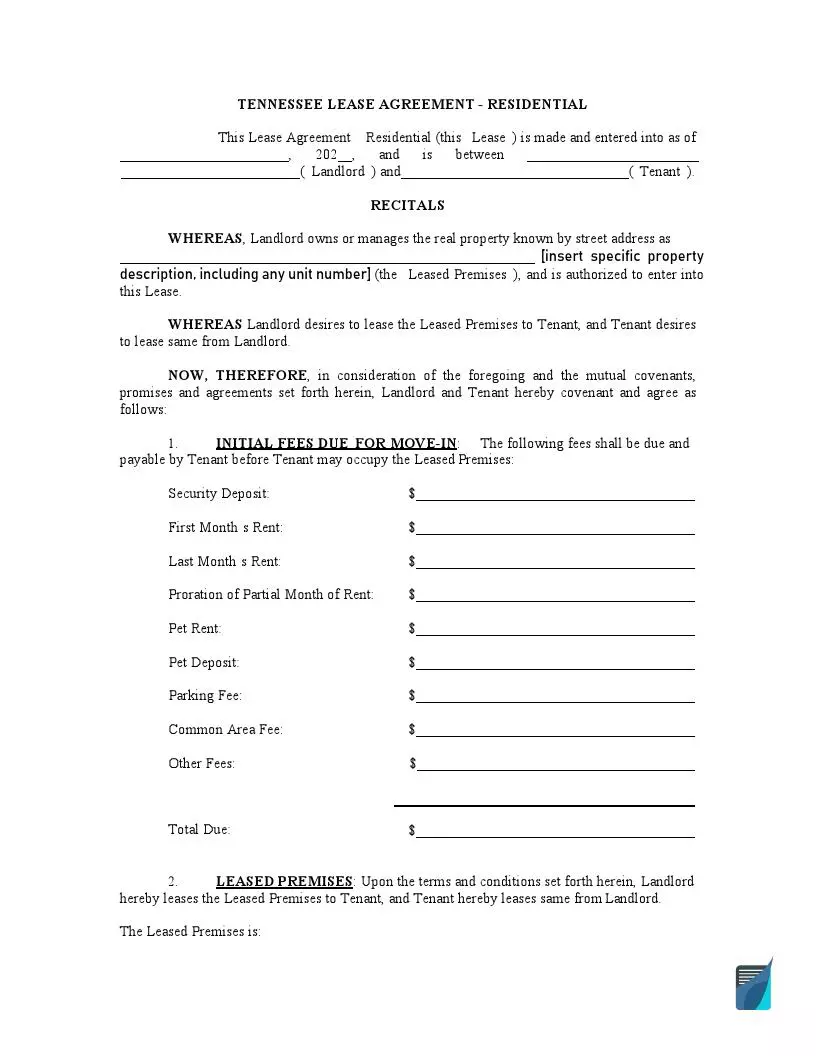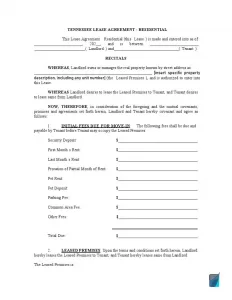Tennessee Rental Lease Agreement Forms
A rental agreement is a common contract between the lessor and the lessee (also called “the landlord” and “the tenant” in most documents). It guarantees their rights and outlines their responsibilities in regards to the leased property. A Tennessee rental agreement is a very common and straightforward form used to rent both commercial and private properties. If you are planning to let or rent a property in Tennessee, no matter what size the property is and what are the relationships between the tenant and the landlord, you should have a lease agreement form.
A Tennessee rental agreement allows the tenant to live on the property if they pay rent regularly and adhere to the rules outlined in the agreement. Both the landlord and the tenant should take their time to decide whether the conditions suit their interests before signing the agreement.
Although many states allow verbal rental agreements for periods up to one year, it is always recommended to have a written lease so that both parties have a copy with clearly outlined terms. Written agreements are also easier to use in court settings.
Use our form building software to create your rental agreement quickly and without effort.

Build Your Document
Answer a few simple questions to make your document in minutes
Save and Print
Save progress and finish on any device, download and print anytime
Sign and Use
Your valid, lawyer-approved document is ready
Tennessee Laws and Lease Requirements
Mandatory Disclosures
According to the United States laws, every lessor planning to let a property built before 1978 must prepare a lead-based paint disclosure. It is mandatory for all states.
Here is the checklist of other disclosures that the lessor should include in a conventional Tennessee lease agreement:
- The full name of the lessor so that they can be easily identified;
- Their address (for legal notices and contact);
- The details on the security deposit and its date of return;
- A statement on how the landlord will show the property to viewers during the last month of the lease in case they want to do so (remember that the 24-hour notice applies).
Security Deposit
The lessor usually asks for a damage deposit (or a “security deposit”) to cover potential damages to the property or outstanding rent if there is any at the end of the tenancy. The tenant pays the security deposit before the start of the lease. The state of Tennessee does not impose limits on how much money the lessor can ask for as a security deposit.
Landlords and tenants often end up in disputes over damages to the property. Both parties should, first of all, remember that “normal wear and tear” is not covered by the security deposit. The tenant will be charged for any damage to the property arising from improper or careless use of items in the property by the tenant themselves or their guests. There could be a separate clause in the lease agreement for a pet deposit in case the tenant has a pet and the landlord allows pets in the property.
In Tennessee, according to the TN Code §66-28-301, the landlord has to return the deposit within 30 days of the tenant leaving the property or within seven days from when the new tenant moved in.
Landlord’s Right of Entry
The tenant should not prevent the landlord from entering the premises for appropriate reasons, such as inspection or repairs. Still, the only case when the landlord can enter without the consent of the tenant is in case there is an emergency. Moreover, the landlord can show the property to prospective tenants in the last month of the lease, but only if this right is included in the lease agreement and with a notice of 24 hours.
Tennessee Rental Lease Agreement Form Details
| Document Name | Tennessee Rental Lease Agreement Form |
| Other Names | TN Rental Lease, Tennessee Residential Lease Agreement |
| Relevant Laws | Tennessee Code Annotated, Title 66, Chapter 28 |
| Security Deposit Amount | No limit |
| Security Deposit Return | Thirty (30) days from termination date |
| Avg. Time to Fill Out | 18 minutes |
| # of Fillable Fields | 119 |
| Available Formats | Adobe PDF |


Take a look at other Tennessee templates completed by our users. Check out our simple builder to personalize these forms to your needs.
